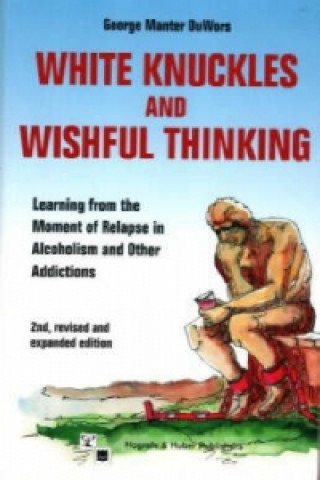
Code: 04755299
White Knuckles and Wishful Thinking
by George DuWors
This book aims to explain the moment of relapse, and to provide practical help for counsellors and clients struggling to avoid relapse. The ideas and techniques are compatible with the Alcoholics Anonymous and other 12-Step progra ... more
- Language:
 English
English - Binding: Paperback
- Number of pages: 400
Publisher: Hogrefe & Huber, 2000
- More about this

You might also like
-

Dune
34.87 zł -33 % -

Haunting Adeline
125.90 zł -1 % -

Berserk Deluxe Volume 2
212.80 zł -1 % -

White Nights
15.41 zł -23 % -

Powerless
47.27 zł -14 % -

Atomic Habits
59.26 zł -26 % -

Dune Messiah
46.36 zł -3 % -

Berserk Deluxe Volume 3
149.99 zł -31 % -

One Day
32.65 zł -36 % -

Berserk Deluxe Volume 1
211.99 zł -2 % -

Iron Flame
62.99 zł -26 % -

Surrounded by Idiots
37.79 zł -26 % -

Harry Potter and the Prisoner of Azkaban (Minalima Edition)
170.56 zł -2 % -

Gravity Falls Journal 3
89.71 zł -

Heaven Official's Blessing: Tian Guan Ci Fu (Novel) Vol. 1
89.10 zł -1 % -

The Creative Act
100.29 zł -15 % -

Dune
38.09 zł -38 % -

Hunting Adeline
130.23 zł -1 % -

A Little Life
48.58 zł -12 % -

Children of Dune
46.77 zł -2 % -

Heaven Official's Blessing: Tian Guan Ci Fu (Novel) Vol. 2
86.79 zł -3 %
Availability alert
Enter your e-mail address and once book will be available,
we will send you a message. It's that simple.
More about White Knuckles and Wishful Thinking
 Book synopsis
Book synopsis
This book aims to explain the moment of relapse, and to provide practical help for counsellors and clients struggling to avoid relapse. The ideas and techniques are compatible with the Alcoholics Anonymous and other 12-Step programmes. DuWors explores the one relentless empirical fact about addictive relapse: at the moment of picking up the first drink/drug we all say one of two things - either "One won't hurt" (or a handful of "wishful" variations) or "Who cares?" (or a smaller, less frequent list of "white knuckle" variations). What does this mean? Why is it that so many different people - different addictions, different stages of the illness, different educational and cultural backgrounds - all say the same thing at this critical moment? After all, this is the very moment that treatment and recovery strive to prevent. And if we could understand it, might we not help more people not have to repeat it? This book comes to the conclusion we have to try and enter the psychic world of the person living it, as well as the perspective of the would-be helper. Like the author, we must sift through psychological and biological theory. But the theories mean nothing if they do not connect with human experience. The book is written for three main groups: (1) professionals and others fighting on the chemical dependency front; (2) trainees seeking to join the fray and their teachers; and (3) clients whose counsellors recommend it. Two specific relapse experiences are the main focus of this approach: (1) exactly how to deal with the actual moment and process of relapse itself; and (2) how the addict looks at himself before and after drinking, and how this "split" plays a key role in perpetuating relapse and blocking recovery. There is one "nuclear" chapter for understanding the "wishful" relapse and another for the "white knuckle" relapse. You will find three chapters on denial, how it functions up to the moment of relapse. You will find three chapters on acceptance - what it is, how it happens, how it prevents relapse. All of the chapters specify tools for talking to self or others about the experience of relapse and how to prevent it from happening again. The relationship between recovery and spirituality is clearly spelled out in terms of the actual relapse experience. The 2nd edition introduces the SPARROW model for coping, for taking the "serenity prayer" down off the wall and putting it to work. Each chapter features study guides for students of chemical dependency and treatment exercises for those struggling with their own relapse.
 Book details
Book details
Book category Books in English Society & social sciences Society & culture: general Social issues & processes
- Full title: White Knuckles and Wishful Thinking
- Author: George DuWors
- Language:
 English
English - Binding: Paperback
- Number of pages: 400
- EAN: 9780889372245
- ID: 04755299
- Publisher: Hogrefe & Huber
- Dimensions: 210 × 150 mm
- Date of publishing: 01. January 2000
safisfied customers
Since 2008, we have served long line of book lovers, but each of them was always on the first place.
Copyright! ©2008-24 libristo.pl All rights reservedPrivacyPoučení o cookies



 21 million books
21 million books Delivery 12.99 zł
Delivery 12.99 zł (32) 444 93 66 (8-15.30h)
(32) 444 93 66 (8-15.30h)